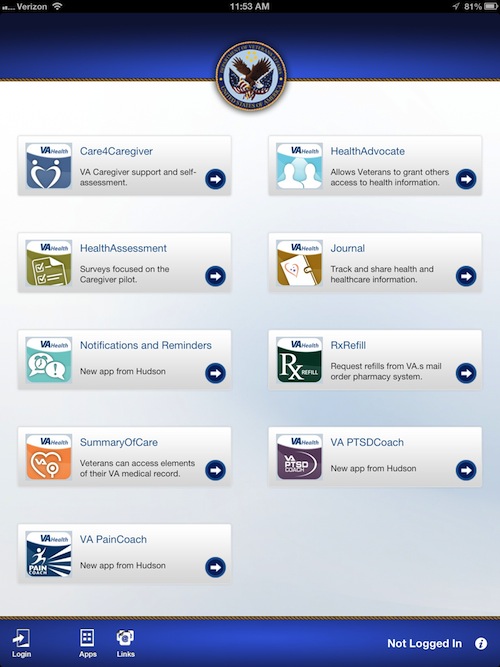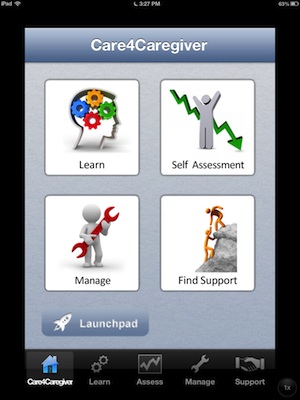 The Department of Veterans Affairs has fully launched its pilot, announced last year, in which it's distributing 1,000 iPads to family caregivers of veterans loaded with 10 specially-created apps.
The Department of Veterans Affairs has fully launched its pilot, announced last year, in which it's distributing 1,000 iPads to family caregivers of veterans loaded with 10 specially-created apps.
"There are three things that we're looking at in the pilot," said Kathleen Frisbee, Director of Web and Mobile Solutions in the Veterans Health Administration. "The first is the impact of the iPads on caregivers' stress and burden. We're looking at the historical stress and burden scores we collect through our home visits on those that have the iPad versus those that don't. The second is looking at caregiver preparedness and trying to understand the impact iPads can have on that. And finally we're looking at the characteristics of caregivers that predict use of the iPad. It's trying to understand the audience, what made people use it versus why they didn't use it."
The suite of apps has been created by a team at the VA and outside contractors Agilex and FirstView. One app, LaunchPad, is a dashboard that serves as a portal to all the others, so that users only have to log in once. HealthAdvocate allows a veteran to give a caregiver access to all of the information he or she has access to. That includes the information from SummaryOfCare, an app that allows the user to, according to the VA's website, "receive and view your VA medical information – including lab results, medications, allergies, information on past and upcoming appointments, progress notes related to clinic visits, hospital discharge notes, radiology results, and more – in one place and from the convenience of your mobile device(s)."
HealthAssessment lets veterans complete some self-assessments and make the results available to their caregiver. Many of the other apps are tools to help manage a veteran's health -- an app providing notifications and reminders about appointments and medications, a journalling app, and a prescription refill app are all part of the suite. Two other apps help veterans coping with particular conditions: PainCoach and PTSD, which is a modified version of the PTSDCoach app the VA released in 2011. The final app, called Care4Caregivers, recognizes the strain on those taking care of a loved one and offers a range of tools for dealing with that stress.
Many of the apps communicate information, mostly in the form of surveys, back to the VA's EHR. Dr. Neil Evans, Associate Chief of Staff, Informatics and Co-Chief at the Primary Care Washington DC Veterans Affairs Medical Center, said that as of now, that information goes to a portal that doctors have to access specially, rather than being integrated.
"We feel at this moment that the data should be accessible to the provider," he told MobiHealthNews. "Optimally, there should be analytics and the process of managing the data would be embedded into the providers' usual workflow application. For us that would be a tremendous amount of work. For now, we're just providing a window so they can look it up. That's an interim solution. Our goal is to manipulate it in a more meaningful way."
 Data from the pilot will start to come back in six months, with the pilot concluding in a year. At that point, according to Evans, the VA will modify the apps based on feedback from the pilot and make them available to all veterans and even to the general public. Although the pilot uses Apple devices, the longterm plan is to create device-agnostic apps, Frisbee told MobiHealthNews.
Data from the pilot will start to come back in six months, with the pilot concluding in a year. At that point, according to Evans, the VA will modify the apps based on feedback from the pilot and make them available to all veterans and even to the general public. Although the pilot uses Apple devices, the longterm plan is to create device-agnostic apps, Frisbee told MobiHealthNews.
"Our decision is to develop in HTML5 so we can work across platforms," she said. "The Family Caregiver pilot apps are native iOS applications, but subsequent developments have been HTML5. At the time [we began working on the pilot] the only approved device for use in the VA was an iOS device. Android had not yet been approved. It was Blackberry or iOS. Since we provided the devices, we ended up there on that particular pilot, but that's not our longterm strategy."
Caregivers are a good choice for a major mobile health pilot, if recent data from the Pew Internet and American Life project is any indication. The survey found that caregivers were more likely than non-caregivers to use online or mobile tools for health. Of the VA pilot, Frisbee said that preliminary response has been positive.
"We've heard from caregivers that they love the mobility, because they can take the data and bring it to other providers that are not VA providers and share it with them," she said. "We've also heard from a couple of the caregivers that the app we designed to support the caregivers themselves and that the e-journaling app are apps that they really like."
The VA also recently launched a second pilot, giving 600 veterans the capability to request appointments via the web and mobile devices.


















